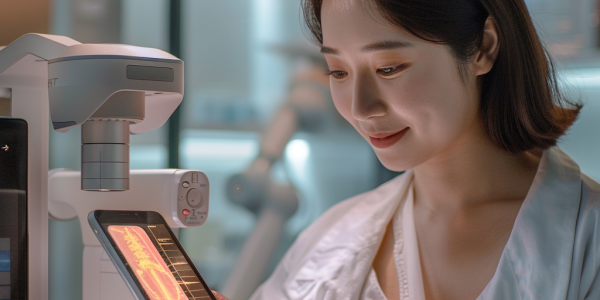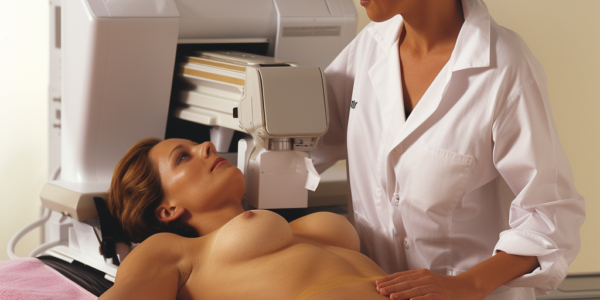China Develops AI-Based System for Enhanced Breast Cancer Screening
A pioneering team at Peking Union Medical College Hospital in China has developed an AI-based infrared thermography (AI-IRT) system for breast cancer screening. This innovative technology allows women to assess their cancer risk via a smartphone app linked to infrared cameras, offering a non-invasive, radiation-free alternative to traditional screening methods. With breast cancer being a significant health concern, this accessible solution aims to enhance early detection and improve patient outcomes.
USPSTF Updates Breast Cancer Screening Guidelines to Start at Age 40
The U.S. Preventive Services Task Force has updated breast cancer screening guidelines, recommending that women at average risk start mammograms at age 40, biennially. This change aims to address rising breast cancer rates among younger women, potentially saving over 8,000 lives annually. Dr. Mary L. Gemignani of the Perlmutter Cancer Center emphasizes the importance of early detection and consistent screening practices to improve patient outcomes.
AI Revolutionizing Women’s Healthcare with Generative AI (GenAI)
Discover how Artificial Intelligence (AI), especially generative AI (GenAI), is revolutionizing women’s healthcare by bridging historical gaps in research and development processes. Learn how AI technologies are addressing disparities in healthcare solutions for women by leveraging physiological and hormonal differences to improve treatment outcomes.
AI Transforms Breast Cancer Detection Through Mammography, Study Shows
Discover how artificial intelligence is revolutionizing breast cancer detection through mammography, as shown in a recent study. Learn about the significant improvements in screening accuracy, efficiency, and reduction in false positives with AI integration. Find out how AI is easing radiologist workloads and patient anxiety, ultimately enhancing healthcare systems.
AI Revolutionizing Breast Cancer Screenings
Researchers are turning to artificial intelligence (AI) to address the shortage of radiologists in conducting breast cancer screenings. A recent study shows promising results in utilizing AI to detect suspicious lesions in mammograms, reducing false-positive findings and enhancing diagnostic accuracy. Lead author Andreas D. Lauritzen highlights the potential benefits of AI integration, including lightening the workload of radiologists, optimizing resource allocation, and improving the detection rate of breast cancers in women undergoing screening.
Controversy Over Canadian Task Force’s Breast Cancer Screening Guidelines
The recent announcement by a Canadian task force on breast cancer screening guidelines has sparked controversy among healthcare professionals. Radiologist Dr. Jean Seely advocates for personalized screening approaches, emphasizing the need for individualized care in breast cancer detection. As discussions continue, it is important for healthcare providers to consider the diverse needs of women. Stay informed on this evolving issue as experts navigate the complexities of mammogram guidelines.
Expert Panel Recommends Lowering Age for Mammography Screening to 40
Learn about the recent recommendation from the U.S. Preventive Services Task Force to lower the age for regular mammography screening to 40, in response to the concerning increase in breast cancer rates among women in their 40s. Dr. John Wong emphasizes the benefits of early detection and the positive impact of regular screenings on women’s health and longevity.
A.I. Revolutionizing Breast Cancer Screening
Artificial intelligence (A.I.) is revolutionizing breast cancer screening, offering the potential to enhance accuracy and detect cancer earlier. A.I. models can detect subtle patterns in mammograms that may be challenging for human radiologists to differentiate, sparking excitement within the medical community. However, concerns remain about the effectiveness of A.I. tools across diverse patient populations and their impact on breast cancer survival rates.
UMNews You Can Use: Tips for Breast Cancer Screening
Learn about the importance of timely and effective breast cancer screenings, including risk factors, screening technology, and frequency recommendations from University of Mississippi physician, Dr. Hubert Spears.
Innovative Breast Imaging Technique Shows Promise in Detecting Cancer
A new breast imaging technique, low-dose positron emission mammography (PEM), has been found to provide high sensitivity for detecting cancer while significantly reducing the likelihood of false positive results. The study suggests that PEM could revolutionize breast cancer detection and potentially offer more reliable screening for a broader range of patients, with comparable performance to MRI but at a lower false positive rate and with a radiation dose comparable to that of traditional mammography.










